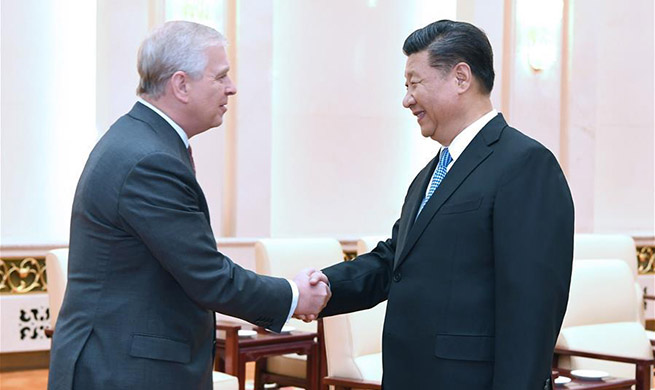BEIJING, May 30 (Xinhua) -- Health experts have applauded China's latest cabinet restructuring as the National Health Commission (NHC) has been granted the leadership role in the work related to tobacco control.
According to the institutional reform of the State Council unveiled in March, government work on tobacco control and the implementation of Framework Convention on Tobacco Control (FCTC) of the World Health Organization (WHO) will be led by the NHC.
Before the reform, the Ministry of Industry and Information Technology (MIIT), which administers the state tobacco monopoly bureau, took the leadership role in the work.
Speaking ahead of World No Tobacco Day, which falls on Thursday, Gauden Galea, WHO representative in China, said the leadership shift for WHO FCTC implementation will make China's tobacco control more effective.
"We look forward to working with the leadership and to doing so with renewed energy," he said.
According to the Healthy China 2030 guideline issued by the central authorities in 2016, the country plans to reduce the smoking rate among people aged 15 and above from 27.7 percent in late 2015 to 20 percent by 2030.
Since China ratified the FCTC in 2005, the country has made a number of tobacco control efforts, including banning tobacco advertisements, increasing tobacco taxes, and banning smoking in public places through local legislation.
Many cities, including Beijing, Shanghai, and Shenzhen, have imposed smoking bans in public places.
Galea spoke highly of the progress in local legislation, calling for more efforts under the leadership of the NHC.
Wu Yiqun, former head of the Chinese Academy of Preventive Medicine, said shifting the institutional leadership on tobacco control is "a huge progress," as it marks termination of the MIIT undertaking the dual role of governing both cigarette sales and tobacco control.
"Tobacco control has finally been freed from the impact of the tobacco industry," she said, adding the move has cleared the way for China to achieve the smoking rate target as set by the Healthy China 2030 guideline.
Jiang Yuan, director of the tobacco control office of the Chinese Center for Disease Control and Prevention (China CDC), said the NHC takes public health as its supreme responsibility, and will help toughen tobacco control in China.
She advised the NHC take the lead in establishing a five-year plan based on the target set in the guideline.
Apart from the NHC and the MIIT, the Ministry of Finance responsible for tobacco tax, and the State Administration of Industry and Commerce in charge of the commercial brands and tobacco advertising, are also involved in the FCTC implementation, said Yang Gonghuan, former deputy head of China CDC.
Yang made eight suggestions in her new book released last week, including legislation at national level on smokefree indoor environments and putting graphics onto cigarette packages to warn smokers of the specific risks of smoking.
China has over 300 million smokers and 740 million people exposed to second-hand smoke.

















